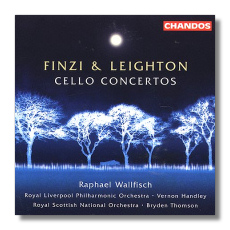
The Internet's Premier Classical Music Source
Related Links
- Finzi Reviews
- Latest Reviews
- More Reviews
-
By Composer
-
Collections
DVD & Blu-ray
Books
Concert Reviews
Articles/Interviews
Software
Audio
Search Amazon
Recommended Links
Site News
 CD Review
CD Review
Gerald Finzi

Concert Works
- Cello Concerto Op. 40
- Eclogue for Piano & Strings Op. 10 *
- Grande Fantasia and Toccata Op. 38 *
Tim Hugh, cello
* Peter Donohoe, piano
Northern Sinfonia/Howard Griffiths
Naxos 8.555766


- Cello Concerto Op. 40
- Kenneth Leighton: Cello Concerto **
Raphael Wallfisch, cello
Royal Liverpool Philharmonic Orchestra/Vernon Handley
** Royal Scottish National Orchestra/Bryden Thomson
Chandos CHAN9949
After being bowled over by Finzi's Clarinet Concerto (Naxos 8.553566) I knew I had to listen to this. I try not to read other reviewer's comments before I listen, but in this case I happened to. The writer compared this concerto with Elgar's! Now, I am not a fervid fan of that piece, but I do like it a lot, so this is big stuff. Sure enough, the opening does call forth the same work by Elgar. Finzi adds an element of anger about the whole situation and for that reason I really prefer it. It is more "emotional".
Finzi wrote his concerto under the knowledge that he had a terminal illness. I have no idea what it was. I consulted three sources, including the notes with these discs. No doubt knowing that you've been drafted will have an affect on you… but I have some reservations about such links. All I can say is that I have enjoyed listening to this music, sort of, over several days.
Now, as to these recordings, this is not even close. Here we have a budget label with soloists that many people might not be familiar with. (Though Donohoe is a name I would hope serious collectors would know… if not you should definitely try out this disc) In the other corner we have "Chandos" and its excellent sound aided by a cellist whose name is better known… and perhaps more so. Well, it isn't even close. David wins hands down… I think there might be a pun in there somewhere.
Hugh digs into the cello; there is a rasp that brings to mind Casals. Listening to this the Elgar certainly came to mind. The sound has that natural sense to it. The orchestra sounds more like a chamber orchestra than the fuller one on Chandos. This is not necessarily to the advantage of Chandos. Griffith's offers an emotional tapestry that is in tune with the soloist.
Then comes Wallfisch. When I saw who the cellist was I was certain that he would offer a better, more emotional interpretation than Naxos' Hugh. Boy, was I wrong. The playing is good and offers another facet to the music. Still, it did not get me involved like the Hugh recording did. I have relistened to the Naxos and Chandos recordings and my feelings have only firmed. Wallfisch leaves me cold, the orchestra is okay but the sound is not as transparent. I miss details I love in the Naxos recording.
I gave the Chandos disc one last listen before wrapping this up. I keep coming to the same conclusions. Taking notes as I listened I made a few here and there… one included the word "tedium". Then I put on the Naxos recording. The quantity of the notes exploded. The orchestra strings have a sharper attack, the conductor uses portmanteau. I keep thinking of ee cummings' line,
since feeling is first
who pays any attention
to the syntax of things
will never wholly kiss you
Don't ask me why that comes to mind, but it does.
As for couplings, here Chandos also does not offer fare that I would prefer. Finzi's Eclogue is one of the most beautiful pieces of music I have ever heard. It is a much earlier piece than the other two and is more like the pastoral Finzi I was more familiar with. This recording is, literally, arresting. The Grande Fantasia and Toccata is new to me. It was written about the same time as the cello concerto. If you like Stokowski's Bach transcriptions you will love this. Donohoe plays piano. Neat. If you already have the Chandos recording you really should add the Naxos.
Post Script: Edward Greenfield, the Gramophone reviewer wrote of the Wallfisch:
"The Finzi receives a performance bigger and bolder than the Naxos, helped by full, warm Chandos sound. With a closer balance for the soloist, the panache of Wallfisch's playing comes over the more forcefully, and the tenderness of the slow movement is reinforced too at a more spacious speed."
He cannot have been listening to the same recording I have. I have seldom so completely disagreed with a fellow writer, who I happen to have great respect for. In many respects our observations are mutually exclusive.
I did, however, agree that Elgar comes to mind.
So it goes.
Copyright © 2002, Robert Stumpf II




















